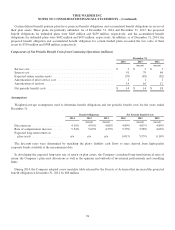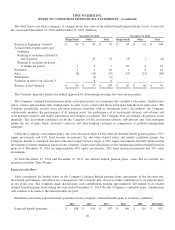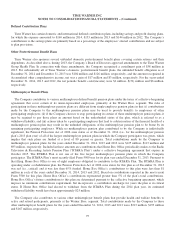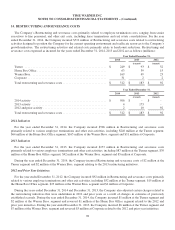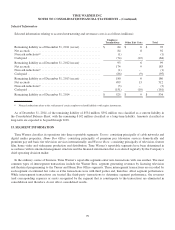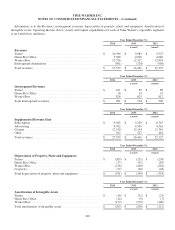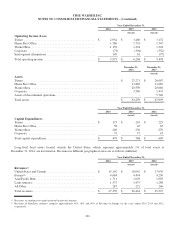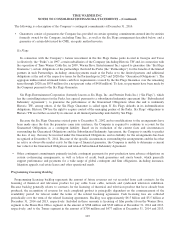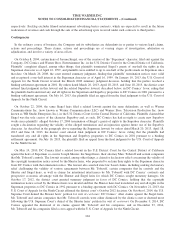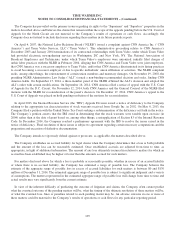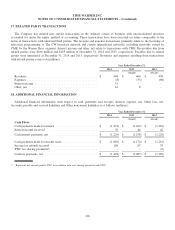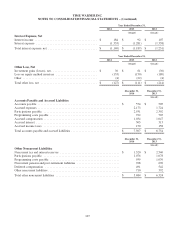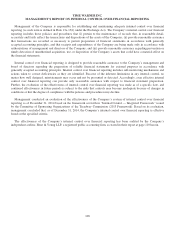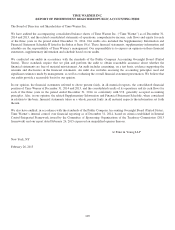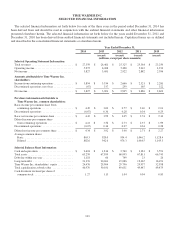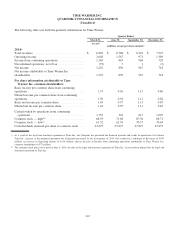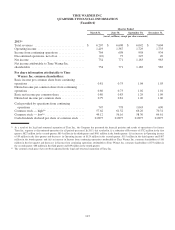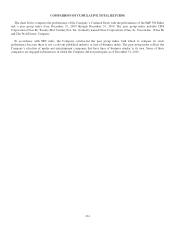Time Magazine 2014 Annual Report Download - page 120
Download and view the complete annual report
Please find page 120 of the 2014 Time Magazine annual report below. You can navigate through the pages in the report by either clicking on the pages listed below, or by using the keyword search tool below to find specific information within the annual report.TIME WARNER INC.
NOTES TO CONSOLIDATED FINANCIAL STATEMENTS – (Continued)
respectively. Backlog excludes filmed entertainment advertising barter contracts, which are expected to result in the future
realization of revenues and cash through the sale of the advertising spots received under such contracts to third parties.
Contingencies
In the ordinary course of business, the Company and its subsidiaries are defendants in or parties to various legal claims,
actions and proceedings. These claims, actions and proceedings are at varying stages of investigation, arbitration or
adjudication, and involve a variety of areas of law.
On October 8, 2004, certain heirs of Jerome Siegel, one of the creators of the “Superman” character, filed suit against the
Company, DC Comics and Warner Bros. Entertainment Inc. in the U.S. District Court for the Central District of California.
Plaintiffs’ complaint alleged, among other things, that plaintiffs terminated Siegel’s grants of one-half the rights in the
Superman character as of April 16, 1999, and plaintiffs were entitled to up to one-half of the profits made on Superman since
that date. On March 26, 2008, the court entered summary judgment, finding that plaintiffs’ termination notices were valid
and recaptured a one-half interest in the Superman character as of April 16, 1999. On January 10, 2013, the U.S. Court of
Appeals for the Ninth Circuit reversed the March 2008 summary judgment decision, holding that the parties reached a
binding settlement agreement in 2001. By orders dated March 20, 2013, April 18, 2013, and June 18, 2013, the district court
entered final judgment in this lawsuit and the related Superboy lawsuit, described below, in DC Comics’ favor, ruling that
the plaintiffs had transferred any and all rights in the Superman and Superboy properties to DC Comics in 2001 pursuant to a
binding settlement agreement. On July 16, 2013, the plaintiffs filed an appeal from the final judgment to the U.S. Court of
Appeals for the Ninth Circuit.
On October 22, 2004, the same Siegel heirs filed a related lawsuit against the same defendants, as well as Warner
Communications Inc. (now known as Warner Communications LLC) and Warner Bros. Television Production Inc. (now
known as WB Studio Enterprises Inc.), in the U.S. District Court for the Central District of California. Plaintiffs claimed that
Siegel was the sole creator of the character Superboy and, as such, DC Comics has had no right to create new Superboy
works since plaintiffs’ alleged October 17, 2004 termination of Siegel’s grants of rights to the Superboy character. Plaintiffs
sought a declaration regarding the validity of the alleged termination and an injunction against future use of the Superboy
character. As described in the paragraph above regarding the Superman lawsuit, by orders dated March 20, 2013, April 18,
2013 and June 18, 2013, the district court entered final judgment in DC Comics’ favor, ruling that the plaintiffs had
transferred any and all rights in the Superman and Superboy properties to DC Comics in 2001 pursuant to a binding
settlement agreement. On July 16, 2013, the plaintiffs filed an appeal from the final judgment to the U.S. Court of Appeals
for the Ninth Circuit.
On May 14, 2010, DC Comics filed a related lawsuit in the U.S. District Court for the Central District of California
against the heirs of Superman co-creator Joseph Shuster, the Siegel heirs, their attorney Marc Toberoff and certain companies
that Mr. Toberoff controls. The lawsuit asserted, among other things, a claim for declaratory relief concerning the validity of
the copyright termination notice served by the Shuster heirs, who purported to reclaim their rights to the Superman character
from DC Comics with the termination notice. The lawsuit also asserted state law based claims, including seeking declaratory
relief challenging the validity of various agreements between Mr. Toberoff, certain companies that he controls and the
Shuster and Siegel heirs, as well as claims for intentional interference by Mr. Toberoff with DC Comics’ contracts and
prospective economic advantage with the Shuster and Siegel heirs for which DC Comics sought monetary damages. On
October 17, 2012, the district court granted summary judgment in favor of DC Comics, holding that the copyright
termination notice served by the Shuster heirs was invalid and that the Shuster heirs had transferred any and all rights in the
Superman properties to DC Comics in 1992 pursuant to a binding agreement with DC Comics. On November 21, 2013, the
U.S. Court of Appeals for the Ninth Circuit affirmed the district court’s October 2012 decision. On October 6, 2014, the U.S.
Supreme Court denied the Shuster heirs’ petition for writ of certiorari. DC Comics’ other claims against the Siegel heirs,
Mr. Toberoff and certain companies that Mr. Toberoff controls were either dismissed by the district court or deemed moot
following the U.S. Supreme Court’s denial of the Shuster heirs’ petition for writ of certiorari. On December 9, 2014, DC
Comics appealed the dismissal of its claims against Mr. Toberoff and his companies, and on December 23, 2014,
Mr. Toberoff and his companies filed a cross-appeal with the U.S. Court of Appeals for the Ninth Circuit.
104


